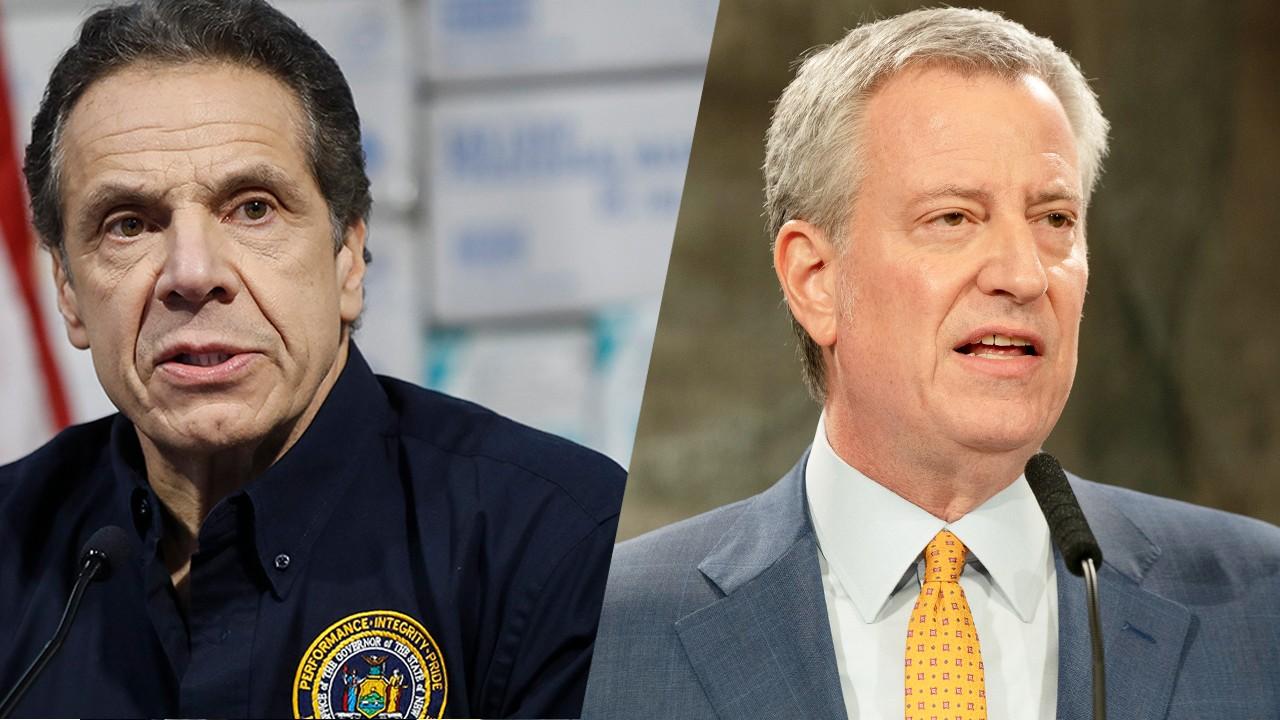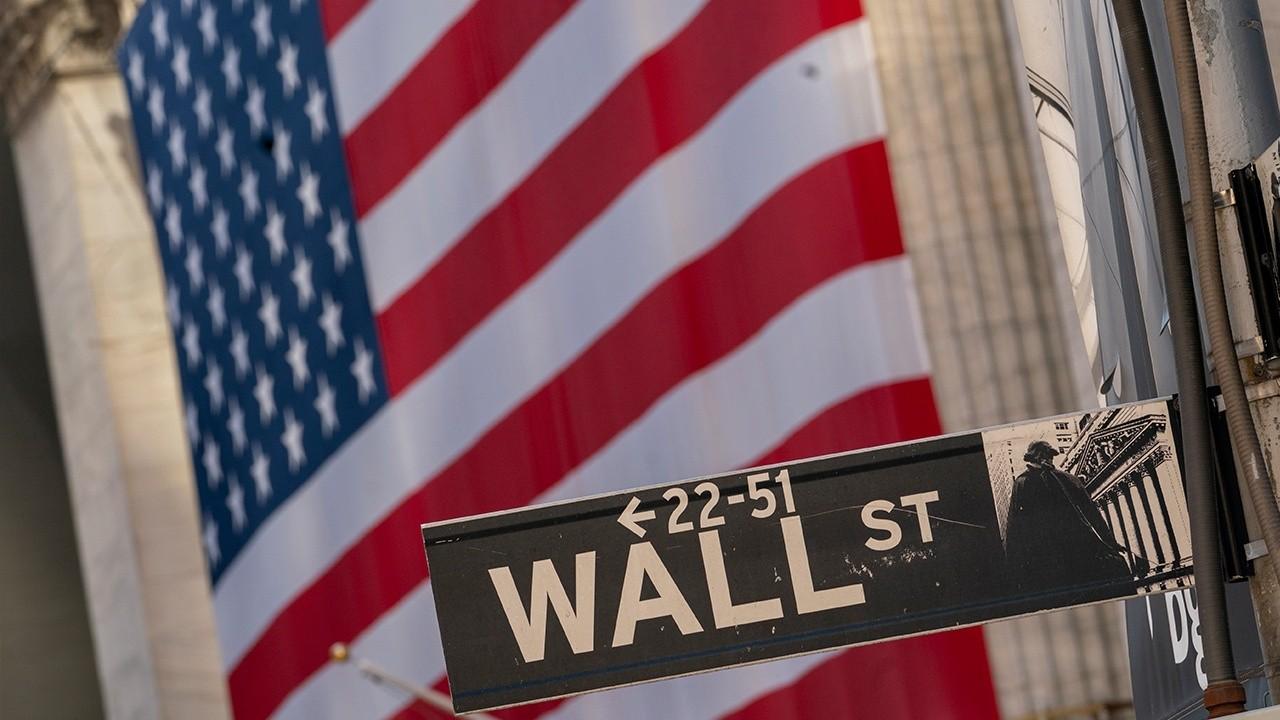Wall Street firms, demonized by Cuomo, de Blasio, ramp up NYC exodus plans
NYC Wall Street fearing rising taxes & crime eye life beyond the Hudson
Cuomo, de Blasio talking up huge tax hikes to cover coronavirus-related budget shortfalls: Gasparino
Sources tell FOX Business’ Charlie Gasparino that banks and lobby groups say tax hikes will hasten out-of-state relocations and expand work-from-home policies.
The COVID-19 pandemic is likely to come to an end in 2021, but that doesn’t mean New York City’s biggest employers—the megabanks and Wall Street firms—are rushing to return to the Big Apple.
FOX Business has learned that even with a vaccine that could allow city employers to filter all their workers back into Manhattan offices by late spring, every major Wall Street firm is drawing up plans to significantly slash its presence in the city for the foreseeable future.
WALL STREET EYEING POTENTIAL MAYORAL CANDIDATES FOR NYC ELECTION
The diminished workforce is a function of several factors, bankers and Wall Street lobbyists tell FOX Business. Those factors include the now proven ability to work outside the office – which in low-cost states like Florida and Texas -- could slash already high Manhattan real estate costs.
But maybe the biggest factor, these people say, is a lack of faith in the ruling political class in New York.
Bankers are blaming New York City Mayor Bill de Blasio for allowing crime to reach new highs during the pandemic, and Gov. Andrew Cuomo for brutal lockdowns that have decimated the small businesses and quality of life in the city.
Earlier today both Cuomo and de Blasio, warned full shutdowns may be ahead.
CORONAVIRUS RELIEF: MORGAN STANLEY COMMITS $2M TO NYC STREET FOOD VENDORS
Lobbyists also fault both men for threatening massive tax increases on bankers and banks to plug the massive COVID-related budget shortfalls of New York City, New York State and important state agencies like the Metropolitan Transportation Authority.
"There’s no question we will see a significant loss of Wall Street talent beyond the pandemic -- how long that lasts and how deep the exodus becomes is a function of whether the political class continues to demonize success," said Kathryn Wylde, the president of the Partnership for New York City, a nonprofit group that advocates for the city’s elite businesses.
The partnership, Wylde told FOX Business, has met with local politicians warning that the planned tax increases — that have recently been broached by both Cuomo and de Blasio—will only expedite the trend of banks moving workers to low-tax states. Florida and Texas, for example, do not have state income taxes.
Last week Oracle joined Hewlett Packard Enterprises in moving headquarters to Texas from California. The Golden State rivals New York when it comes to taxes on individuals and businesses. Tesla CEO Elon Musk chose the state for his latest factory and relocated his personal residence to Texas as well.
TESLA'S ELON MUSK DITCHES CALIFORNIA FOR TEXAS. HERE'S WHAT AWAITS HIM
Wylde added that if the new taxes go into effect, banks have alerted her that they will look for ways to keep their high earners from working full-time in the city. Such a move could make the city and state's budget shortfalls even more significant since New York would be deprived of high-end earners' tax dollars and consumer spending.
"Only half of bankers will be back by July 2021 and 75% could be back by end of 2021 but not fulltime," Wylde said. "But if there’s an increase in the income tax that affects those high earners, they are more likely to continue working remotely and that’s when we’ll see operations move out of the city."
Wall Street firms and similar industries -- such as real estate and insurance -- that will be targeted by tax increases, employ some 500,000 people in the city where most are headquartered. In addition to representing tens of billions of dollars in direct tax revenues for the city and the state, these high earners spread the wealth through their consumer spending, which helps to employ many other New Yorkers in various service-related jobs.
Investment houses telling clients divided government could cap spending, Biden tax increases: Gasparino
FOX Business’ Charlie Gasparino on how Wall Street is reacting to the election results so far.
For the past decade, Wall Street firms and banks have been moving more and more of their employees to Texas and Florida to take advantage of the lower costs and taxes. But the pandemic is likely to speed up that trend because firms have found ways to let employees work from home and not in spacious expensive suites in the city.
Any planned tax increases will further expedite the exodus, bankers say. The State of New York Governor's Office and the City of New York Mayor's Office did not immediately respond to a request for comment.
FOX Business has previously reported that JP Morgan Chase, the nation’s biggest bank, is looking to expand outside of New York even as it maintains its New York City headquarters. The bank will stagger the return of its workforce back into the city once the pandemic subsides. Still, workers will be asked to work from home several days a week as part of the plan.
TRUMP PRAISES JPMORGAN FOR TELLING TRADING STAFF TO RETURN TO THE OFFICE
Goldman Sachs and Deutsche Bank are also planning moves outside of the city; Goldman is internally discussing moving its asset management division to either Florida or Texas.
Taken together, the possible departures could have significant implications for the city and state economy. New York City nearly fell into bankruptcy in the 1970s amid rising crime, lower quality of life and an exodus of companies out of state.
Big businesses in the city saw a renaissance starting in the 1980s during the stock-market boom. It continued into the 1990s and well into the 2000s when Mayors Rudy Giuliani and Mike Bloomberg cracked down on crime and embraced the business community while holding the line on taxes.
But with the 2014 election of progressive Bill de Blasio, crime began to spike, and the business community became an object of scorn and a target of tax increases. COVID appears to have widened the gulf between the mayor and Wall Street as de Blasio has said he wants to target the banks and their executives for tax increases amid the budget shortfalls.
JAMIE DIMON WOULD BE BETTER NYC MAYOR THAN DE BLASIO: NAVARRO
Under New York law, any major personal tax increase must be approved by the governor’s office. Cuomo has resisted tax increases in the past, fearing that they would lead to an exodus of high-end workers and businesses from the city.
Now Cuomo appears to be joining the mayor in calling for them to plug COVID deficits as the New York State legislature and most city Democrats have moved further to the left on issues such as taxing the rich.
"It took two decades to build back from the ‘70s when half of 500 fortune companies left the city," Wylde added. "If this keeps going and politics remain as they are now it will be a return to that."






















